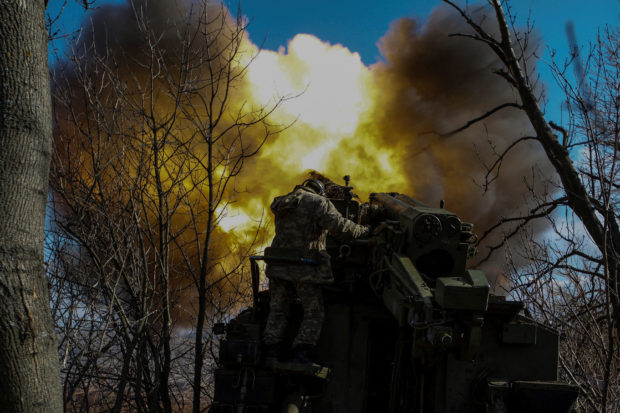Ukraine vows not to give up on Bakhmut amid constant Russian attacks

Ukrainian servicemen fire a 2S5 Giatsint-S self-propelled howitzer towards Russian troops outside the frontline town of Bakhmut, amid Russia’s attack on Ukraine, in Donetsk region, Ukraine March 5, 2023. REUTERS
KYIV — Ukraine’s top military commanders have vowed to keep defending the besieged city of Bakhmut, where Russia is hoping to make its first major wartime gain in more than half a year, and will strengthen their defenses, President Volodymyr Zelensky said.
Amidst some of the bloodiest fighting of the more than one-year long invasion, Moscow says capturing the city would be a step towards its major objective of seizing the full territory of the surrounding Donbas region.
The General Staff of Ukraine’s armed forces late on Monday reported that the city and surrounding areas were under “constant attacks” as “the enemy takes no account of losses.”
After Russian gains in recent weeks, at the culmination of a winter offensive, Ukrainian troops have been reinforcing positions west of Bakhmut in apparent preparation for a possible retreat.

However, late on Monday, Zelensky said that at a meeting of top military officials he had asked the commander of the regional grouping and Ukraine’s commander in chief how they proposed to proceed.
“Both generals responded not to withdraw but to strengthen (our defenses),” he said in his nightly address.
“I told the commander in chief to find the appropriate forces to help our guys in Bakhmut.”
The intense battle has depleted both sides’ artillery reserves, with thousands of shells fired daily along the eastern and southern fronts. Kyiv’s European allies are working on a deal to procure more ammunition for the fight.
The head of Russia’s Wagner mercenary force, which is leading the Bakhmut assault, said on Monday he needed the regular army to supply him with more ammunition, reinforcements and covering support if he was to win the battle.
The appeal from Wagner founder Yevgeny Prigozhin came amid signs of a deepening rift between him and the Russian defence ministry whom he has bitterly criticised for months and accused of deliberately starving his men of ammunition, an allegation it has rejected.
“I’m knocking on all doors and sounding the alarm about ammunition and reinforcements, as well as the need to cover our flanks,” he said in a statement released by his press service.
“If everyone is coordinated, without ambition, screw-ups and tantrums, and carries out this work, then we will block the armed forces of Ukraine. If not, then everyone will be screwed.”
There was no immediate response from the Russian Ministry of Defence.
Separately, Reuters reported Kyiv has broadened a request for controversial cluster bombs from the United States to include a weapon that it wants to cannibalize to drop the anti-armor bomblets it contains on Russian forces from drones, according to two U.S. lawmakers.
A National Security Council spokesperson said that while Ukraine and the White House “closely coordinate” on military aid, she had no “new capabilities to announce.”
Bakhmut more symbolic than strategic, says US
After losing ground during the second half of 2022, Russia launched a winter offensive of intense trench warfare, making use of hundreds of thousands of reservists called up late last year.
Russia’s offensive has produced no notable gains, failing to seize ground in Luhansk province further north and taking heavy losses in particular around Vuhledar to the south.
Ukraine has focused mainly on defence for the last three months, trying to inflict high casualties while preparing for a counter-offensive when new weapons arrive and the muddy ground dries out.
Speaking to reporters in the Middle East on Monday, U.S. Defense Secretary Lloyd Austin said he would not predict when or if Ukrainian troops might leave Bakhmut, but that should it fall that “won’t necessarily mean that the Russians have changed the tide of this fight”.
“I think it is more of a symbolic value than it is strategic and operational value,” Austin said.
Kyiv says Russia’s losses in trying to seize a city already reduced to rubble could determine the future course of the war by destroying combat power ahead of decisive battles later this year.
Russia refers to the campaign as a “special military operation” but has increasingly reframed initial denunciation of “Nazis” in Ukraine to describe it as a fight against the “collective West” which threatens its very existence.
Ukraine and the West describe Russia’s actions as an unprovoked war of aggression aimed at expanding territory.
On Monday, Russia’s FSB security service said it had thwarted a Ukraine-backed car bomb attack against a prominent nationalist businessman who has been a cheerleader for Moscow’s war. There was no immediate comment from Ukraine.